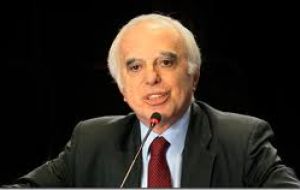MercoPress. South Atlantic News Agency
“Few chances” of an EU/Mercosur trade agreement in a context of global crisis
 EU wants too much and offers too little, according to Pinheiro Guimaraes.
EU wants too much and offers too little, according to Pinheiro Guimaraes. In the current global context “it’s hard to see an advance in the free trade negotiations with the European Union” said on Wednesday the block’s High representative Ambassador Samuel Pinheiro Guimaraes.
He added that trade obstacles among Mercosur members are ‘specific’ and can be tracked to the huge increase in exports and imports in recent years.
“Trade among Mercosur members has increased immensely to almost 45 billion dollars annually” said the Brazilian diplomat that holds Mercosur highest post in an informal chat with foreign correspondents.
“The reported cases of obstacles to inter-trade which surface regularly are few, when you compare them with the overall volume” said Pinheiro Guimaraes.
“There is the impression that we have an enormous problem but it is not so because trade keeps expanding and when this happens dislocations can occur as well as momentary obstacles”, added the top official.
Most of these problems have an economic, political and social root since they are geared “to protect jobs”. Likewise companies “are always complaining about something: they want improved conditions, less taxes, more protection from competitors and at the same more trade freedom for their products”.
He added that in spite of these outbreaks investment to the Mercosur block has not decreased or stalled rather the contrary.
Specifically on trade talks with the EU, which resumed in May 2010, following six years of freeze, Pinheiro Guimaraes said that in a context of crisis it’s difficult to advance, “since the EU won’t shave its subsidies”
“EU proposals are very modest, they ask for a lot and what they offer is very little” said the Mercosur chief adding that in some cases the proposed quotas are inferior to current export volumes.
“An agreement of this kind is attractive if both sides increase exports in a more or less balanced way. Free trade by itself is not necessarily good, good is development”.
The former head of the Brazilian Executive Strategic Affairs Department said that the current financial crisis is only comparable to the 1929 depression and “we need a deeper and more solid effort to clean the financial sector”.
The crisis “only did not contaminate those sectors that were not deregulated in emerging economies such is the case of Brazil, Argentina, Chile, where the financial sector is highly regulated by the State with an overall supervision, absent in the financial systems of advanced countries”.
Pinheiro Guimaraes said that the current crisis is far from over and “there is not sufficient political pressure on the US to adopt more radical measures”.
Not putting pressure on the people, but pressure on the big corporations that have had extraordinary earnings this year, while in Europe the policies are geared “to contract, which only aggravates the crisis”.
Nevertheless once the crisis is over there won’t be surprises: “the US is the most powerful country in the world by far from in economic, technology, scientific, military, political, cultural fields, you name them”, concluded Pinheiro Guimaraes.




Top Comments
Disclaimer & comment rules-

-

Read all commentsThis will be the time of bi-lateral national FTAs that can be modified or closed down according to the need of the moment.
Oct 20th, 2011 - 11:47 am 0Big Bloc Trade is off the agenda for the forseeable future.
The phrase 'Every man for himself' comes to mind.
I agree.
Oct 20th, 2011 - 02:38 pm 0Commenting for this story is now closed.
If you have a Facebook account, become a fan and comment on our Facebook Page!